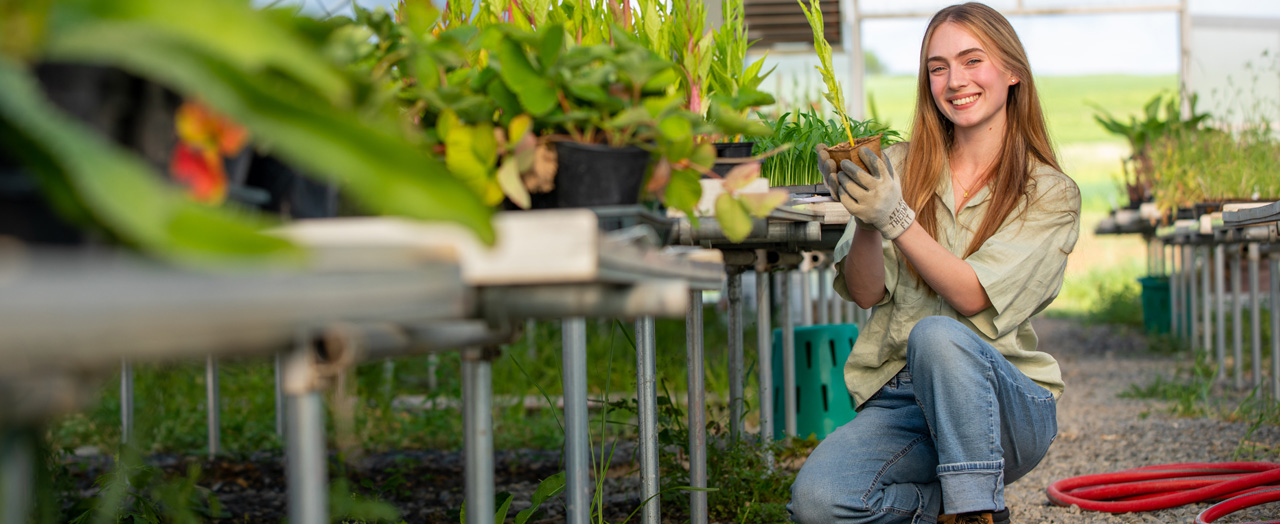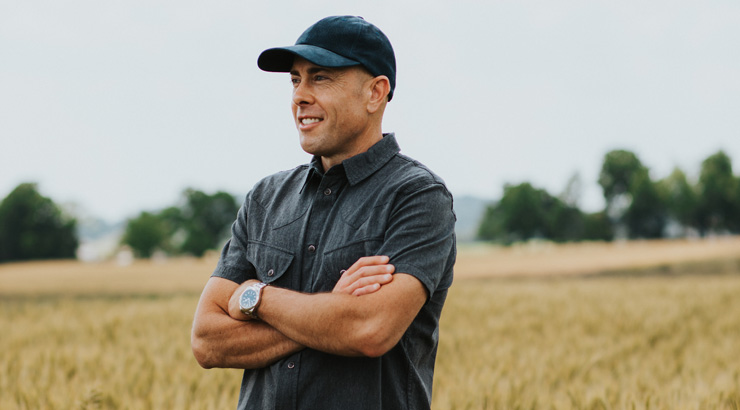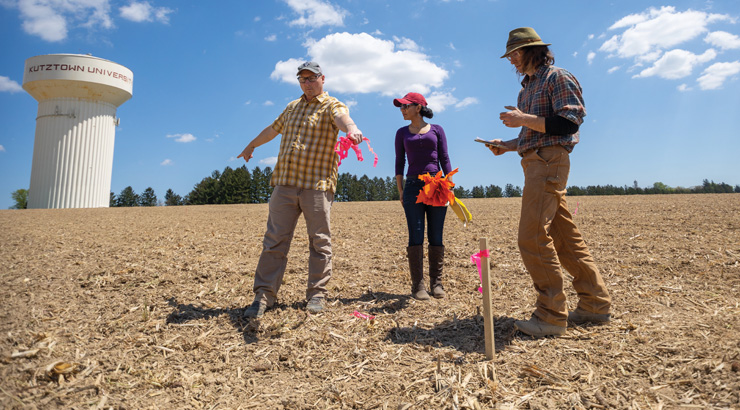
Partnering for Change
BY VICKI MAYK

Junior Ava Esterly is so committed to a career in regenerative organic agriculture that she transferred to Kutztown University to study it.
Esterly, a native of Pottstown, Pa., became interested in regenerative organic agriculture studying abroad in Spain while enrolled at another university. The farming practice promotes soil health while avoiding the use of chemical fertilizers and pesticides.
After returning to the U.S., she researched internships at Rodale Institute, the world’s leader in advancing regenerative organic agriculture. Through her search, Esterly learned about a unique undergraduate program at KU focusing on regenerative organic agriculture. The program, launched in 2022, is a dedicated track within KU’s environmental science major. It was developed in partnership with Rodale.
In spring 2024, Esterly completed her first year as an environmental science major in the regenerative organic agriculture track, followed by a 12-week summer internship at Rodale Institute farm, just six miles from KU’s campus. Now a junior, Esterly says regenerative organic agriculture marries many of her interests.
“Food systems are related to so many aspects of our lives and to our ecology,” says Esterly, whose long-term career goal is research. “Studying about them is a really great intersection of so many important topics.”
The importance was underscored in February 2024, when the Pennsylvania Department of Community and Economic Development awarded a $1.5 million grant to support KU’s regenerative organic agriculture track. State Rep. Mark Rozzi ’96 played a pivotal role in securing the funding.
The grant will support student scholarships; internships; renovations to the university teaching greenhouse, which is adjacent to the newly built Nancy Jean Stump Seiger ’54 Botanical Research Center; professional development for students, faculty and Rodale Institute employees; farming equipment and land care.
Expanding a partnership
The grant will support student scholarships; internships; renovations to the university teaching greenhouse, which is adjacent to the newly built Nancy Jean Stump Seiger ’54 Botanical Research Center; professional development for students, faculty and Rodale Institute employees; farming equipment and land care.
The partnership to develop the new regenerative organic agriculture program began after KU alumnus and Rodale Institute CEO Jeff Tkach ’01 met KU President Kenneth S. Hawkinson.
“I have Dr. Hawkinson to thank for the partnership,” Tkach says. “I explained to him that there’s going to be a whole workforce gap with people who want to be involved in this field. So many young people want to get involved in this movement that Rodale is helping to lead. The regenerative organic farming movement is a very youthful movement.” Studies show that 86 percent of people under age 18 in the U.S. have purchased an organic food item in the last month.
Rodale Institute scientists worked with environmental science faculty to develop the curriculum for the new academic track. KU signed a five-year partnership agreement with the institute in August 2021. The agreement provides KU students and faculty the opportunity to partner with Rodale Institute personnel and researchers from around the world on field research in the areas of soil health, organic practices for farming and pest management, composting and pollinators. Internship opportunities will also be available for students.
One of the most enthusiastic proponents of the partnership was KU trustee Jim Ludlow, who has served on the Council of Trustees since 2013 and is currently the president of Liquid Interactive in Allentown.
“Berks and Lehigh counties offer a wide range of wonderful experiential and learning experiences for our students,” Ludlow said of partnerships like the one with Rodale. “We only need to reach out and make the connections.”
Tkach says working with his alma mater is a full-circle moment for him. He developed an interest in a healthy lifestyle in his teens and remembers studying in the peaceful setting of Rodale Institute farm when he was at KU. After graduating with a marketing degree, he joined Rodale Press publishing company, first selling advertising for its magazine Men’s Health. He was promoted to management positions and in 2008, became the publisher of the company’s flagship publication, Organic Gardening. He assumed his current role at Rodale Institute in 2023, which has positioned him to be at the forefront of a global movement.
“In the last five years, there’s been explosive growth and interest in regenerative organic farming,” Tkach says. “Most people don’t realize that Rodale was a founder of this entire movement, which is now a $100 billion industry worldwide. Fifty-eight of the world’s top 100 food companies have a regenerative agriculture strategy.”
Kutztown University graduates will be prepared to work within that industry. Possible jobs include agriculture and food scientists, farm or greenhouse manager, sustainability consultant and more.
A dynamic curriculum
The regenerative organic agriculture curriculum is structured differently than other science classes, says Dr. Jacob Sewall, associate professor and environmental science program coordinator. In addition to taking required environmental science core courses, students enroll in one-credit classes covering topics such as fundamentals of regenerative agriculture, concepts of food justice, soil science, agricultural entomology and more. All students enrolled in the one-credit classes participate together in a collaborative regenerative field lab. It follows a model that provides an authentic, research-based experience.
“There’s a recognition that if we’re training scientists, they should know how to do science as a discovery and creativity process, because that’s what real science is,” Sewall says.
At the heart of the lab is an 18-acre sustainable agriculture research field. Students are conducting research spanning several years to assess the best methods for regenerating soil at the site. One experiment involves treating soil samples with compost, biochar, and a combination of both to see which option is most effective at enhancing the soil. Biochar is a carbon-rich material that improves soil nutrients. A second experiment at the field involves planting different cover crops and assessing how well they impact the diversity of the microbial community found in the soil. Students gathered baseline data to measure how much bacteria and fungi are found in the soil. Rodale assisted with equipment to plant the field.
About 20 students are enrolled in the regenerative organic agricultural track so far, but students in other environmental science tracks also take classes. Senior Rachel Erb from Sinking Spring, Pa., who is in the biology track, takes classes and completed an internship at Rodale Institute. She has career interests in research and health care.
“One of the things that Rodale’s model promotes is healthy soil equals healthy plants equals healthy people,” Erb says. “I strongly believe that our diet can lead to a better life, but not everyone has that access.”
Sewall says that KU environmental scientists and their students are attracted to studying regenerative organic agriculture because it offers a chance to be proactive about environmental challenges.
“I think a lot of the time we spend in environmental science involves carefully measuring things that are going wrong. The question becomes, ’What can we do?’ (regenerative organic agriculture) … is certainly going to impact the lives of individuals, things as small as the soil microbes and it also has the potential to impact things on the scale of climate change. It’s great to be able to involve people in research and teach them about the way things can go right instead of just teaching them about the way things have gone wrong in the past.”

Expanding a partnership
The grant will support student scholarships; internships; renovations to the university teaching greenhouse, which is adjacent to the newly built Nancy Jean Stump Seiger ’54 Botanical Research Center; professional development for students, faculty and Rodale Institute employees; farming equipment and land care.
The partnership to develop the new regenerative organic agriculture program began after KU alumnus and Rodale Institute CEO Jeff Tkach ’01 met KU President Kenneth S. Hawkinson.
“I have Dr. Hawkinson to thank for the partnership,” Tkach says. “I explained to him that there’s going to be a whole workforce gap with people who want to be involved in this field. So many young people want to get involved in this movement that Rodale is helping to lead. The regenerative organic farming movement is a very youthful movement.” Studies show that 86 percent of people under age 18 in the U.S. have purchased an organic food item in the last month.
Rodale Institute scientists worked with environmental science faculty to develop the curriculum for the new academic track. KU signed a five-year partnership agreement with the institute in August 2021. The agreement provides KU students and faculty the opportunity to partner with Rodale Institute personnel and researchers from around the world on field research in the areas of soil health, organic practices for farming and pest management, composting and pollinators. Internship opportunities will also be available for students.
One of the most enthusiastic proponents of the partnership was KU trustee Jim Ludlow, who has served on the Council of Trustees since 2013 and is currently the president of Liquid Interactive in Allentown.
“Berks and Lehigh counties offer a wide range of wonderful experiential and learning experiences for our students,” Ludlow said of partnerships like the one with Rodale. “We only need to reach out and make the connections.”
Tkach says working with his alma mater is a full-circle moment for him. He developed an interest in a healthy lifestyle in his teens and remembers studying in the peaceful setting of Rodale Institute farm when he was at KU. After graduating with a marketing degree, he joined Rodale Press publishing company, first selling advertising for its magazine Men’s Health. He was promoted to management positions and in 2008, became the publisher of the company’s flagship publication, Organic Gardening. He assumed his current role at Rodale Institute in 2023, which has positioned him to be at the forefront of a global movement.
“In the last five years, there’s been explosive growth and interest in regenerative organic farming,” Tkach says. “Most people don’t realize that Rodale was a founder of this entire movement, which is now a $100 billion industry worldwide. Fifty-eight of the world’s top 100 food companies have a regenerative agriculture strategy.”
Kutztown University graduates will be prepared to work within that industry. Possible jobs include agriculture and food scientists, farm or greenhouse manager, sustainability consultant and more.

A dynamic curriculum
The regenerative organic agriculture curriculum is structured differently than other science classes, says Dr. Jacob Sewall, associate professor and environmental science program coordinator. In addition to taking required environmental science core courses, students enroll in one-credit classes covering topics such as fundamentals of regenerative agriculture, concepts of food justice, soil science, agricultural entomology and more. All students enrolled in the one-credit classes participate together in a collaborative regenerative field lab. It follows a model that provides an authentic, research-based experience.
“There’s a recognition that if we’re training scientists, they should know how to do science as a discovery and creativity process, because that’s what real science is,” Sewall says.
At the heart of the lab is an 18-acre sustainable agriculture research field. Students are conducting research spanning several years to assess the best methods for regenerating soil at the site. One experiment involves treating soil samples with compost, biochar, and a combination of both to see which option is most effective at enhancing the soil. Biochar is a carbon-rich material that improves soil nutrients. A second experiment at the field involves planting different cover crops and assessing how well they impact the diversity of the microbial community found in the soil. Students gathered baseline data to measure how much bacteria and fungi are found in the soil. Rodale assisted with equipment to plant the field.
About 20 students are enrolled in the regenerative organic agricultural track so far, but students in other environmental science tracks also take classes. Senior Rachel Erb from Sinking Spring, Pa., who is in the biology track, takes classes and completed an internship at Rodale Institute. She has career interests in research and health care.
“One of the things that Rodale’s model promotes is healthy soil equals healthy plants equals healthy people,” Erb says. “I strongly believe that our diet can lead to a better life, but not everyone has that access.”
Sewall says that KU environmental scientists and their students are attracted to studying regenerative organic agriculture because it offers a chance to be proactive about environmental challenges.
“I think a lot of the time we spend in environmental science involves carefully measuring things that are going wrong. The question becomes, ’What can we do?’ (regenerative organic agriculture) … is certainly going to impact the lives of individuals, things as small as the soil microbes and it also has the potential to impact things on the scale of climate change. It’s great to be able to involve people in research and teach them about the way things can go right instead of just teaching them about the way things have gone wrong in the past.”
This article originally appeared in the 2024 Tower Magazine.





